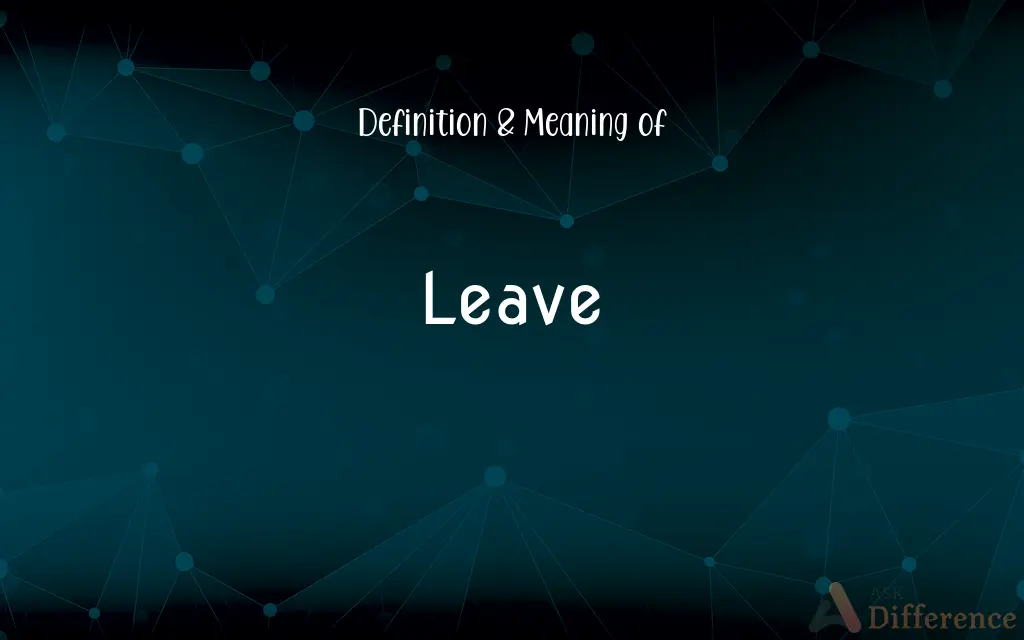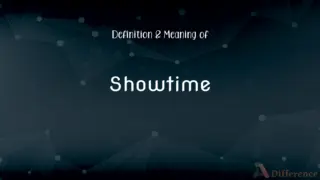Leave Definition and Meaning
By Fiza Rafique & Urooj Arif — Updated on February 29, 2024
"Leave" means to go away from a place or person, often implying a departure from a previous state or condition. e.g., She decided to leave the party early.

Table of Contents
Leave Definitions
Leave refers to allowing something to remain as is.
Leave the door open for fresh air.
Leave signifies taking a temporary absence, often from work.
She's on leave for two weeks.
Leave means to let someone or something alone.
Leave the cat to sleep in its corner.
Leave conveys the act of exiting a location.
They decided to leave the cinema early.
Leave suggests putting something in a certain place or condition.
Leave your shoes at the door.
Leave denotes giving up or relinquishing a right or claim.
He chose to leave his share of the inheritance.
Leave refers to causing to remain as a result or consequence.
The storm left the streets flooded.
To omit or exclude
Left out the funniest part of the story.
To abandon or forsake
Leave home.
Left her husband.
(Nonstandard) To allow or permit; let.
See leave of absence.
To have a consequence or remnant.
(transitive) To cause or allow (something) to remain as available; to refrain from taking (something) away; to stop short of consuming or otherwise depleting (something) entirely.
I left my car at home and took a bus to work.
The ants did not leave so much as a crumb of bread.
There's not much food left. We'd better go to the shops.
To cause, to result in.
The lightning left her dazzled for several minutes.
Infantile paralysis left him lame for the rest of his life.
She left disappointed.
(transitive) To put; to place; to deposit; to deliver, with a sense of withdrawing oneself.
Leave your hat in the hall.
We should leave the legal matters to lawyers.
I left my sewing and went to the window to watch the falling snow.
To depart; to separate from.
(transitive) To end one's membership in (a group); to terminate one's affiliation with (an organization); to stop participating in (a project).
I left the band.
To transfer something.
(transitive) To transfer possession of after death.
When my father died, he left me the house.
Permission to be absent; time away from one's work.
I've been given three weeks' leave by my boss.
To send out leaves; to leaf; - often with out.
To desert; to abandon; to forsake; hence, to give up; to relinquish.
Lo, we have left all, and have followed thee.
The heresies that men do leave.
Act or be so as to become in a specified state;
The inflation left them penniless
The president's remarks left us speechless
Move out of or depart from;
Leave the room
The fugitive has left the country
Leave involves abandoning or deserting a place or person.
The old house was left abandoned.
To go out of or away from
Not allowed to leave the room.
To go without taking or removing
Left my book on the bus.
To have as a result, consequence, or remainder
The car left a trail of exhaust fumes. Two from eight leaves six.
To cause or allow to be or remain in a specified state
Left the lights on.
To have remaining after death
Left a young son.
To bequeath
Left her money to charity.
To give over to another to control or act on
Leave all the details to us.
To remove oneself from association with or participation in
Left the navy for civilian life.
To give or deposit, as for use or information, upon one's departure or in one's absence
He left a note for you. Leave your name and address.
To cause or permit to be or remain
Left myself plenty of time.
To set out or depart; go
When can you leave?.
To put forth foliage; leaf.
Permission to do something.
An act of departing; a farewell
Took leave of her with a heavy heart.
To let be or do without interference.
I left him to his reflections.
I leave my hearers to judge.
(transitive) To depart from; to end one's connection or affiliation with.
I left the country and I left my wife.
(intransitive) To depart; to go away from a certain place or state.
I think you'd better leave.
(transitive) To give (something) to someone; to deliver (something) to a repository; to deposit.
I'll leave the car in the station so you can pick it up there.
(transitive) To transfer responsibility or attention of (something) (to someone); to stop being concerned with.
Can't we just leave this to the experts?
To remain (behind); to stay.
To stop, desist from; to "leave off" (+ noun / gerund).
(transitive) To give leave to; allow; permit; let; grant.
We were not left go to the beach after school except on a weekend.
To produce leaves or foliage.
(obsolete) To raise; to levy.
(cricket) The action of the batsman not attempting to play at the ball.
(billiards) The arrangement of balls in play that remains after a shot is made (which determines whether the next shooter — who may be either the same player, or an opponent — has good options, or only poor ones).
Permission.
Might I beg leave to accompany you?
The applicant now seeks leave to appeal and, if leave be granted, to appeal against these sentences.
(dated) Farewell, departure.
I took my leave of the gentleman without a backward glance.
To raise; to levy.
An army strong she leaved.
To withdraw one's self from; to go away from; to depart from; as, to leave the house.
Therefore shall a man leave his father and his mother, and shall cleave unto his wife.
To let remain unremoved or undone; to let stay or continue, in distinction from what is removed or changed.
If grape gatherers come to thee, would they not leave some gleaning grapes ?
These ought ye to have done, and not to leave the other undone.
Besides it leaveth a suspicion, as if more might be said than is expressed.
To cease from; to desist from; to abstain from.
Now leave complaining and begin your tea.
To let be or do without interference; as, I left him to his reflections; I leave my hearers to judge.
I will leave you now to your gossiplike humor.
To put; to place; to deposit; to deliver; to commit; to submit - with a sense of withdrawing one's self from; as, leave your hat in the hall; we left our cards; to leave the matter to arbitrators.
Leave there thy gift before the altar and go thy way.
The footThat leaves the print of blood where'er it walks.
To have remaining at death; hence, to bequeath; as, he left a large estate; he left a good name; he left a legacy to his niece.
To cause to be; - followed by an adjective or adverb describing a state or condition; as, the losses due to fire leave me penniless; The cost of defending himself left Bill Clinton with a mountain of lawyers' bills.
To depart; to set out.
By the time I left for Scotland.
To cease; to desist; to leave off.
Leave off, and for another summons wait.
Liberty granted by which restraint or illegality is removed; permission; allowance; license.
David earnestly asked leave of me.
No friend has leave to bear away the dead.
The act of leaving or departing; a formal parting; a leaving; farewell; adieu; - used chiefly in the phrase, to take leave, i. e., literally, to take permission to go.
A double blessing is a'double grace;Occasion smiles upon a second leave.
And Paul after this tarried there yet a good while, and then took his leave of the brethren.
The period of time during which you are absent from work or duty;
A ten day's leave to visit his mother
Permission to do something;
She was granted leave to speak
The act of departing politely;
He disliked long farewells
He took his leave
Parting is such sweet sorrow
Go away from a place;
At what time does your train leave?
She didn't leave until midnight
The ship leaves at midnight
Go and leave behind, either intentionally or by neglect or forgetfulness;
She left a mess when she moved out
His good luck finally left him
Her husband left her after 20 years of marriage
She wept thinking she had been left behind
Leave unchanged or undisturbed or refrain from taking;
Leave it as is
Leave the young fawn alone
Leave the flowers that you see in the park behind
Make a possibility or provide opportunity for; permit to be attainable or cause to remain;
This leaves no room for improvement
The evidence allows only one conclusion
Allow for mistakes
Leave lots of time for the trip
This procedure provides for lots of leeway
Result in;
The water left a mark on the silk dress
Her blood left a stain on the napkin
Remove oneself from an association with or participation in;
She wants to leave
The teenager left home
She left her position with the Red Cross
He left the Senate after two terms
After 20 years with the same company, she pulled up stakes
Put into the care or protection of someone;
He left the decision to his deputy
Leave your child the nurse's care
Leave or give by will after one's death;
My aunt bequeathed me all her jewelry
My grandfather left me his entire estate
Have left or have as a remainder;
That left the four of us
19 minus 8 leaves 11
Be survived by after one's death;
He left six children
At her death, she left behind her husband and 11 cats
Tell or deposit (information) knowledge;
Give a secret to the Russians
Leave your name and address here
Leave behind unintentionally;
I forgot my umbrella in the restaurant
I left my keys inside the car and locked the doors
Leave means to depart from a place or position.
He had to leave home for college.
Leave implies granting permission or freedom to do something.
The teacher will leave you to choose your topic.
Leave Snonyms
Exit
To go out of or leave a place.
Please exit through the rear door.
Abandon
To give up completely or leave behind.
The house has been abandoned for years.
Withdraw
To remove oneself from a place or situation.
She withdrew from the competition due to an injury.
Retreat
To withdraw or move back.
The army retreated after a fierce battle.
Depart
To go away or exit.
He departed from the office early today.
Vacate
To leave a place that one previously occupied.
Tenants were asked to vacate the premises by the end of the month.
Forsake
To renounce or turn away from entirely.
He decided to forsake his old ways and start anew.
Desert
To leave without permission or intent to return.
The soldier was accused of deserting his post.
Quit
To leave (a place), usually permanently.
He quit his job to travel the world.
Flee
To run away from a place or situation of danger.
Residents fled the town after the flood warnings.
Leave Idioms & Phrases
Take it or leave it
To accept something as it is without modifications or to reject it completely.
The seller said the offer was final – take it or leave it.
Leave no stone unturned
To do everything possible or explore all options in order to achieve something.
The detective promised to leave no stone unturned in the search for the missing painting.
Leave well enough alone
To avoid trying to improve something that is already adequate, as doing so might cause problems.
He decided to leave well enough alone and not repaint the perfectly good wall.
Leave a bad taste in one's mouth
To create a negative impression or feeling.
The way the meeting ended left a bad taste in her mouth.
Leave someone cold
To not impress someone or evoke a response.
The movie's ending left the audience cold.
Leave someone to their own devices
To allow someone to do as they wish without interfering.
The teacher left the students to their own devices after giving the assignment.
Leave at the altar
To suddenly abandon someone, especially not showing up for a wedding.
He shocked everyone when he decided to leave her at the altar.
Leave in the lurch
To abandon someone in a difficult situation without help.
When her car broke down, her so-called friend left her in the lurch.
Leave high and dry
To put someone in a very difficult situation without assistance.
The sudden departure of the team leader left the rest of the group high and dry.
Leave holding the bag
To be left with the responsibility or blame for something.
When the project failed, the junior staff were left holding the bag.
Leave the door open
To create an opportunity for something to occur in the future.
The agreement left the door open for further negotiations.
Leave one hanging
To keep someone in a state of uncertainty or suspense.
The unresolved ending of the book left readers hanging.
Leave the nest
To move out of one's parents' home and live independently.
After college, he was ready to leave the nest and move to a different city.
Leave to chance
To allow something to be decided by random or unpredictable factors.
He didn't want to leave his career to chance, so he planned carefully.
Leave with one's tail between one's legs
To depart in a state of defeat or humiliation.
After the rejection, he left the office with his tail between his legs.
Leave in a huff
To depart angrily or suddenly.
After the argument, she left in a huff.
Leave out in the cold
To exclude someone from a group or activity.
They felt left out in the cold during the team discussions.
Leave a lot to be desired
To be inadequate or unsatisfactory.
The service at the restaurant left a lot to be desired.
Leave one's mark
To have a lasting impact or influence.
The artist left his mark with his innovative style.
Leave Example Sentences
Can you leave a message for her?
They were sad to leave their grandparents' house.
She decided to leave the book on the table.
I have to leave for school in ten minutes.
They told him to leave the wild animals alone.
She didn't want to leave her friends behind.
Please leave your coats in the hallway.
He was excited to leave on his first solo trip.
They agreed to leave the decision up to me.
The movie was so bad, we had to leave halfway through.
We should leave this place cleaner than we found it.
He had to leave the game early due to an injury.
He forgot to leave the keys under the mat.
She had to leave work early to pick up her brother.
Can I leave my bike here while I shop?
Common Curiosities
How many syllables are in leave?
There is 1 syllable in "leave."
What is the root word of leave?
The root word of leave is the Old English word "læfan."
Why is it called leave?
It is called leave because it comes from the Old English word "læfan," meaning to allow to remain, omit, or to trust, entrust, commit to one's care.
What is a stressed syllable in leave?
In the word "leave," the single syllable "leave" is the stressed syllable.
How is leave used in a sentence?
Leave is used as a verb, e.g., "She will leave the house at noon."
What is the verb form of leave?
Leave itself is the base form of the verb.
What is the first form of leave?
The first form is "leave" (present tense).
How do we divide leave into syllables?
Leave is not divided into syllables as it is a single syllable word.
What is another term for leave?
Another term for leave is "depart" or "exit."
Is leave a noun or adjective?
Leave is a verb, not a noun or adjective.
Is leave a vowel or consonant?
The word "leave" starts with a consonant.
Is leave a collective noun?
No, leave is not a collective noun; it's a verb.
Is the word “leave” a Direct object or an Indirect object?
"Leave" is a verb and can act upon a direct object, e.g., "She will leave the house."
What is the pronunciation of leave?
Leave is pronounced as /liːv/.
Is leave an adverb?
No, leave is not an adverb; it is a verb.
Is leave a negative or positive word?
Leave is neutral; it can be either negative or positive depending on the context.
Is the word leave imperative?
Leave can be used in the imperative form, e.g., "Please leave the room."
Is the word leave Gerund?
The gerund form of leave is "leaving."
Which determiner is used with leave?
As a verb, leave typically doesn't use determiners. When used as a noun, as in "leave of absence," determiners like "a," "an," or "the" may be used.
What is the second form of leave?
The second form is "left" (past tense).
Is leave a countable noun?
Leave is not a noun; it is a verb and therefore not countable.
Which conjunction is used with leave?
Conjunctions are not specific to the word "leave" and depend on the sentence structure. Examples include "and," "but," or "or."
Which article is used with leave?
Articles are typically not used directly with verbs like "leave." When used as a noun in a phrase like "leave of absence," the article "a" or "the" may be used.
What is the third form of leave?
The third form is "left" (past participle).
What part of speech is leave?
Leave is a verb.
What is the singular form of leave?
Leave does not have a singular form as it is a verb, not a noun.
What is the plural form of leave?
Leave does not have a plural form; verbs do not have plural forms.
What is the opposite of leave?
The opposite of leave could be "arrive" or "stay."
Is leave an abstract noun?
No, leave is not a noun; it is a verb.
Is the leave term a metaphor?
The word "leave" can be used metaphorically in certain contexts, but it is not inherently a metaphor.
Which vowel is used before leave?
Vowels are not typically used before verbs like leave.
Which preposition is used with leave?
Prepositions used with "leave" vary based on context, like "leave from a place" or "leave for a journey."
Share Your Discovery

Previous Term
Showtime Definition and Meaning
Next Term
Respond Definition and MeaningAuthor Spotlight
Written by
Fiza RafiqueFiza Rafique is a skilled content writer at AskDifference.com, where she meticulously refines and enhances written pieces. Drawing from her vast editorial expertise, Fiza ensures clarity, accuracy, and precision in every article. Passionate about language, she continually seeks to elevate the quality of content for readers worldwide.
Co-written by
Urooj ArifUrooj is a skilled content writer at Ask Difference, known for her exceptional ability to simplify complex topics into engaging and informative content. With a passion for research and a flair for clear, concise writing, she consistently delivers articles that resonate with our diverse audience.




































